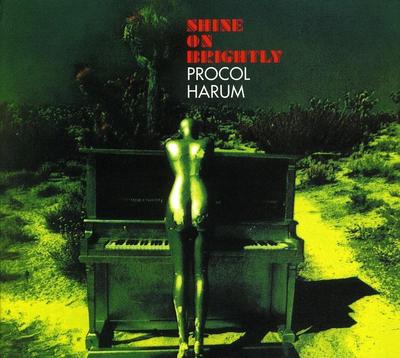In 1967, a pimply 16-year-old Catholic-school boy flicked on the AM radio of his dad's 1963 Ford Fairlane and heard "A Whiter Shade of Pale." Performed by the English band Procol Harum, the song turned the kid's head around. Its mournful organ reminded him of church. Its lyrics qualified as poetry, because they didn't mean anything. The band's exotic name came from some kind of ignorant Latin. The singer sounded strained and not quite professional, but strange voices were okay then. Mainly, the song was different.
Soon, on the mysterious "underground" FM radio station broadcasting from the University of Washington, the boy heard other songs by Procol Harum from the band's first album. The guitar on "Conquistador" sounded like a knight waving a battle flag. "Kaleidoscope" charged hard and desperate -- "Lonely in the dark I grope," oh yeah.
The kid drove to the new mall (all malls were new) and used his meager savings to purchase the album, which was pressed in mono-reprocessed-for-stereo and sounded more artificial than the regular mono, but what the hell. After soaking up the ghostly black-and-white cover, he discovered that the songs were nearly all written and sung by the pianist, Gary Brooker. The drummer, BJ Wilson, brilliantly accented the memorable melodies with ungroovelike clobber and wristy subtlety. Searing, distorted guitar tones surged from the fingers of Robin Trower, who crowned the collection with a passionate solo on organist Matthew Fisher's gloomy instrumental "Repent Walpurgis" -- a solo that expressed every ounce of the boy's adolescent torture. The kid decided then and there that this was the song he wanted played at his funeral.
Only half great, that first album was nevertheless greater than the second, 1968's "Shine on Brightly," which proved hard to find despite its glorious green cover depicting a metallic mannequin at a piano in the desert. "Brightly" did boast soulful odes to alienation such as the celebratory "Quite Rightly So" and the stabbing title track. But it also exposed resident poet Keith Reid's unripe ambition, which glared forth in the 18-minute revelation-quest "In Held 'Twas in I." "The words which I use are pretentious and make you cringe with embarrassment," Reid admitted -- a wonderful moment. The lyricist knew he was overreaching, but COULDN'T HELP IT.
Brooker was seized by an unprecedented and perfectly complementary vision. Though he considered himself an R&B crusader, his whiteboy throatmanship on his own jazzed-up ditties (such as "Lime Street" in 1967) or Leiber & Stoller's roadhouse blues "I Keep Forgetting" (1975) proved he was no Otis Redding or even Chuck Johnson. Though he owned a three-octave range, Brooker sounded confident mainly when he was channeling his classical chops into powerful rock.
Classical-rock crested in 1969 with Procol Harum's "A Salty Dog," truly a BAND record. Want some gut blues along with yer Jesus on "Crucifiction Lane"? Let Trower sing it. Want some wistful sensitivity on "All This and More" and "Wreck of the Hesperus"? Let Fisher sing 'em. And when Brooker just had to unleash his Blind Boy persona on "Juicy John Pink" and "The Milk of Human Kindness," he struck the right level of restraint. But riding the celestial stomp of "The Devil Came From Kansas" and especially the folky classicism of "A Salty Dog," Brooker sang Reid's cohesive words as no one else could've -- with a heart-ripping dignity that would bring tears to the boy's eyes even half a century later.
Although Fisher jumped ship after "Dog," the absence didn't sink Procol, as the epic "Whaling Stories" (from the 1970 album "Home") and the crunching rockers "Simple Sister" and "Memorial Drive" (from the 1971 hit "Broken Barricades") testified. Through the years, Brooker's songwriting prowess never slacked.
It was Trower's turn to launch a solo frigate, and our fankid predicted the end of Procol. But the band scored an unlikely chartbuster with a 1972 symphony resurrection of "Conquistador." Then Brooker and new guitarist Mick Grabham roared forward with two of the band's shiniest recordings, "Grand Hotel" and "Exotic Birds and Fruit," both packed with ace rockers and imperial luxuries.
The boy saw Procol Harum live four times, digging the group's latter-day music even after the inimitable drummer BJ Wilson died in 1990. Through punk years and jazz years and metal years, the boy admired Gary Brooker's high standards, his humble demeanor and his triple talent. But as Brooker sang so calmly on 1967's "Homburg" (Procol's best song), "The signposts cease to sign." Today, "A Whiter Shade of Pale" is back on the U.K. charts.
* * *
Brooker already bade a creaky farewell in 2017, with the deeply emotional "Somewhen." Cry along here.
* * *
Top 5 Procol Harum Albums
1. A Salty Dog (1969)
2. Broken Barricades (1971)
3. Exotic Birds and Fruit (1974)
4. Grand Hotel (1973)
5. Novum (2017)
* * *
Read MetalJazz's review of a 2010 show here.
Read Greg Burk's L.A. Weekly review of a 2003 show here.

